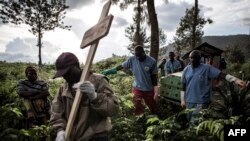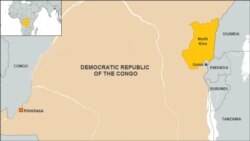The International Federation of Red Cross and Red Crescent Societies says that community mistrust was the cause of an attack on Red Cross volunteers in the eastern Democratic Republic of Congo this week. The attack took place during a burial service for an Ebola victim in Ituri province.
Two of the 18 Red Cross volunteers performing a burial service of a suspected Ebola victim Monday were seriously injured. They are recovering in a hospital, where they are receiving medical and psychological care.
The director of health and care at the Red Cross Federation, Emanuele Capobianco, tells VOA the attack was fueled by mistrust and suspicion among some members of the community.
"The attackers came from within the community and there was a moment of panic during the burial that made the mob react and go after the team of volunteers that were performing the burial… and some of them were attacked with machetes,” he said.
The World Health Organization reports that 3,382 cases of Ebola, including 2,232 deaths, have occurred in Congo's North Kivu and Ituri provinces since the start of the outbreak in August 2018. The epidemic is unfolding in an area affected by a two decades-long conflict that has claimed countless lives.
Capobianco says this unstable, dangerous situation has raised fear and hostility in communities toward responders.
"The episode was regrettable and I think the expression of the frustration in the communities seeing this Ebola outbreak continuing month after month," he said. "You know, this is a year-and-a-half now. And, that is a way that the frustration and the fear is manifesting.”
Capobianco says the attack is a sign that the Red Cross needs to do more to build community trust and acceptance. He says the hundreds of volunteers involved in Ebola operations come from the communities in which they work. He says this is one of their strengths.
After the volunteers recover from the shock of the attack, he says they will go back into the communities. The Red Cross official says they will talk and listen to what they have to say while continuing to involve them in the Ebola response.










